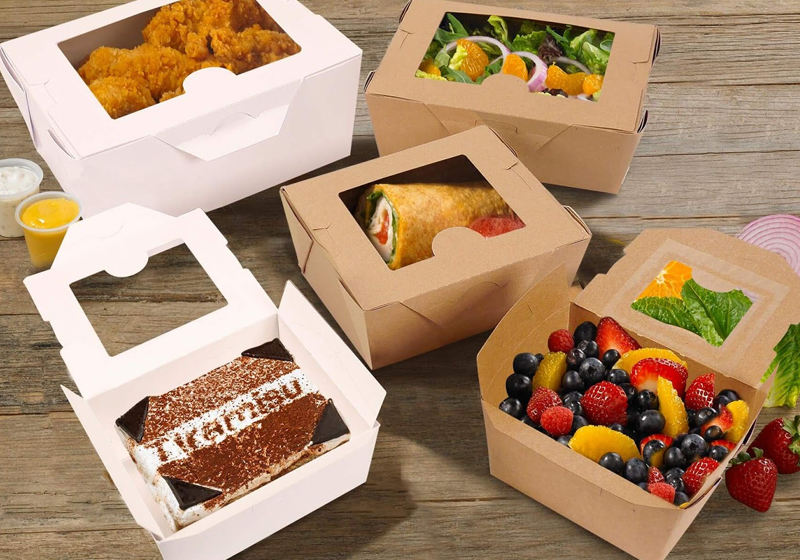1. Environmental Benefits: Reducing Plastic Pollution and Promoting Ecological Balance
Biodegradability
Compared to traditional plastics, disposable biodegradable paper boxes are made from natural materials such as wood pulp, bamboo, or recycled paper and can decompose quickly in the natural environment, typically within weeks to months. This characteristic significantly reduces the pressure on landfills and avoids long-term pollution of soil and water bodies caused by microplastics.
Reducing Carbon Footprint
The raw materials for producing paper boxes mostly come from plants, which absorb carbon dioxide during growth, offsetting part of the carbon emissions generated during manufacturing. Additionally, the energy consumption for producing paper boxes is lower than that of plastic, further reducing greenhouse gas emissions.
Protecting Wildlife
Plastic waste is one of the main sources of ocean pollution, causing countless marine animals to die each year due to ingestion or entanglement. After decomposition, disposable biodegradable paper boxes leave no harmful residues, effectively reducing threats to wildlife.
2. Functional Advantages: Meeting Diverse Needs
Wide Applicability
These paper boxes exhibit excellent versatility and can be used in various fields such as food, retail, healthcare, and e-commerce. For example, in the catering industry, they can hold hot meals, cold drinks, and even greasy foods; in e-commerce, they serve as lightweight yet durable shipping packages.
Safety and Hygiene
Many disposable biodegradable paper boxes undergo special treatments to provide oil-resistant, waterproof, and heat-resistant properties, ensuring food remains fresh and clean during transportation and storage. This enhances user experience and complies with food safety standards.
Easy Customization
The surface of paper boxes can be printed with various patterns, brand logos, or information, combining practicality with promotional functions. This flexibility offers businesses opportunities to showcase their brand image while enhancing consumer purchasing intent.
3. Economic Benefits: Driving Green Economic Development
Growing Market Demand
As consumers' environmental awareness increases, more people are willing to pay a premium for sustainable products. By adopting disposable biodegradable paper boxes, companies can attract environmentally conscious customers and enhance brand value, thereby increasing market share.
Policy Support
Governments worldwide are introducing measures to restrict plastic use, such as imposing "plastic taxes" or banning single-use plastic products. In this context, switching to biodegradable paper boxes helps companies avoid potential legal risks while benefiting from policy incentives like subsidies.
Promoting Employment and Innovation
The production and promotion of biodegradable paper boxes require extensive technological research and supply chain optimization, creating new job opportunities in related industries. It also promotes the development of agriculture, forestry, and waste management sectors, forming a virtuous cycle.

4. Social Benefits: Enhancing Public Image and Responsibility
Building a Responsible Brand Image
In today’s society, corporate social responsibility is increasingly being scrutinized. Choosing disposable biodegradable paper boxes demonstrates a company's commitment to environmental protection, helping to win consumer trust and support. Studies show that over 60% of consumers prefer to buy products from environmentally friendly brands.
Educating the Public to Participate in Environmental Protection
When consumers encounter biodegradable paper boxes, they gradually become aware of the environmental impact of their actions and are more likely to actively participate in waste sorting and resource recycling. This "ripple effect" helps build a culture of universal participation in environmental protection.
Achieving Zero Waste Goals
Many companies and communities are implementing "zero waste" initiatives, and disposable biodegradable paper boxes are crucial tools for achieving these goals. By converting waste into compost, not only can the total amount of garbage be reduced, but organic fertilizer can also be provided for agriculture, contributing to the circular economy.
5. Additional Advantages Brought by Technological Progress
Improved Production Processes
With advancements
in technology, modern papermaking techniques can now produce paper boxes that are both lightweight and robust while significantly lowering production costs. This makes disposable biodegradable paper boxes increasingly competitive in terms of cost-effectiveness compared to traditional plastic containers.
Application of New Materials
Scientists are exploring more innovative materials, such as cornstarch-based plastics and straw fiber composites, which can further enhance the performance of paper boxes and shorten degradation times.
Intelligent Design
Some high-end disposable biodegradable paper boxes incorporate smart elements, such as temperature-sensitive coatings or QR code labels. These features not only improve user experience but also offer businesses new avenues for data collection and marketing.










 English
English русский
русский Español
Español 中文简体
中文简体











